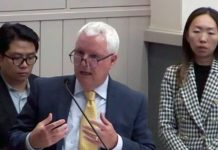When Stephen Rossi applied Sept. 2 to fill out the remaining three months of former Councilmember Marina Khubesrian’s term, he did so to help the city clean up its considerable financial management problems and thought he could do so in time for voters have all the information they need to decide how to vote Nov. 3 on the Utility Users Tax extension.
Rossi, who’d been studying and was critical of the city’s financial reporting and management, was appointed with broad support, promising to bring his skills as a merger and acquisition expert to the municipal morass of South Pasadena’s overdue audits and budget.
His first initiative was to secure Council approval for the creation of a Finance Ad Hoc Committee that would do the tedious work of assisting finance staff to complete the 2019 and 2020 audits, so that work on the overdue 2020-21 budget can commence, recommend new monthly closing and finance reporting practices, and consider the need for a more thorough forensic audit.
But he was “met with initial resistance from the city management in terms of providing access to information that was required to actually clean up the financial issues,” he told the South Pasadenan News. That caused delays.
Moreover, “from the information I was eventually provided, I realized that it was a much deeper and entrenched problem than I had originally anticipated and much more far-reaching.” He said former City Manager Stephanie DeWolfe’s attempts to reduce staff across every department had limited the city’s ability to provide resources to residents. The problems weren’t just in the Finance Department, but in Planning and Public Works as well.
These practices “caused us to rely too heavily on outside consultants, which does not provide the cost savings one would expect because consultants tend to be more expensive.”
He also concluded that, “Over the last few years the city has forgotten that they have policies in place.” One example is the monthly Treasurer’s report certifying the city has sufficient funds to meet its obligation over the coming six months. “I can’t tell you when the last time that actually happened was. It’s one of the reasons the Council was not pushed to take action on the lack of financial reporting earlier.”
Rossi said he “started getting more exposure to what City Hall was.” That’s when “it dawned on me there was a lot more work to be done.” He decided to stand for election for the Council seat he’d been appointed to. His decision came too late to file as a regular candidate, so he commenced a write-in campaign that will culminate when he squares off against Jack Donovan, the long-time South Pasadena resident and community volunteer whose name is the only one that will actually appear on Nov. 3 ballot for District 2.
But while putting the city’s finances back in order got him on the Council, his decision to stay has caused him to bear down on many of the city’s other issues.
Meantime he’s still in a battle with City Attorney Teresa Highsmith over access to prior privileged material and legal bills shared with other Council members before he was appointed. Rossi says he needs the material to fulfill his Council duties, especially as a member of the Finance Ad Hoc Committee. The Council agreed to seek a formal opinion from the Attorney General. Last week, Highsmith rejected edits Rossi wanted to put in the letter. It was agreed he’ll write a separate letter that she’ll include as an attachment to hers.
A clear priority for Rossi was the removal of DeWolfe, who was still in charge though weakened in part by the resignation of Khubesrian, who’d been DeWolfe’s biggest booster. Within 10 days of his appointment, Rossi noted, the Council held a special meeting where it voted unanimously to separate from DeWolfe. “Prior to my appointment,” he said, there was an expectation DeWolfe would retire under the golden parachute plan the Council had adopted weeks earlier. “That changed after I got appointed to the council.”
“Part of the issue we had regarding City Hall was a lack of trust in the decisions that were getting made at the Council level as well as at the staff level,” Rossi said. “After the events of the last three years and the issues that were created for the Finance, Public Works and Planning Departments, to offer an extended retirement package was frankly not in the best interest of the community or of rebuilding credibility with residents.”
Rossi also said it was he who initially made contact with Sean Joyce to find out if Joyce would be interested in the Interim City Manager position to which he was selected and hired Sept. 23.
Another issue Rossi championed is “empowering” the city’s dozen-or-so citizen commissions. Commissions used to be able to set their own agenda but several years ago DeWolfe changed that so the agendas are set exclusively by staff.
“That’s problematic for a handful of reasons” and led some commission chairs to resign. If the city wants to maintain the high caliber of citizens who volunteer to serve on commissions, “we don’t want to marginalize them. We don’t want our city manager to be micromanaging” what they do. It’s not an effective way to run an organization, he said. His plan does not preclude staff from also placing items on commission agenda.
While there is demand for more underrepresented groups on commissions and committees, “quotas are not the way to go,” Rossi believes. “It creates too many problems.” Rather the city should employ a “Diversity, Equity, Inclusion (DEI) platform to create proactive outreach to the community.”
Rossi recently got approval from his Council colleagues to agendize the creation of an ad hoc committee on commissions that he hopes will be composed of current and former commission chairs, “to present a review of best practices for how commissions should run and operate.”
Noting the Police Chief reports were not to the Council but to the City Manager, Rossi said he does not support calls for the resignation of Chief Joe Ortiz in response to controversies besetting that department. As for budgeting, there can be no line-by-line review of the SPPD budget before there is a broader understanding of the city’s overall financial issues, which cannot be done until the finances are cleaned up, he said.
“The broader issue with SPPD is the same as with the rest of City Hall,” namely: culture. “As leadership, we need to exercise good judgment and do our homework.” The city should bring in a DEI program to provide better training for police officers on “how to handle what has become an increasingly charged and frequent series of incidents throughout the community,” and do so in a way “where they are truly de-escalating without being afraid to take action.”
Some of the problems that have arisen have more to do the department’s “communication and transparency,” he added. “When people are not provided information, they make up their own minds about what happened.” Communication out of SPPD after the Oct. 3 incident when a man drove his truck onto the sidewalk at Fair Oaks and Mission to confront a Black Lives Matter protester was “sparse,” he said, and terminology in its press releases was “poorly choiced.” But they represented a margin of progress. Under DeWolfe, “those releases probably wouldn’t have happened at all.”
Rossi said the city needs to be more transparent about what’s going on in SPPD and other departments as well, “and when we make mistakes, we should take accountability for them.”
“Timeliness of information is a significant issue in City Hall,” not just at SPPD but also with the processing of planning permits and public records requests, the latter of which under DeWolfe were being vetted by others besides the City Clerk, he said. It is was not a matter of resources, he said, but of leadership and culture.
On Oct. 26, the city filed its appeal of the 2,062 housing units it is being required to plan for over the next eight years under the Regional Housing Needs Assessment. Although he is pessimistic it will result in a significant reduction, Rossi supports the appeal. He said the real question is how to ensure the city has more control and decision-making over how much and how fast it addresses the need for affordable housing.
Noting that only 10 percent to 15 percent of units in the handful of recently-approved developments in South Pasadena are dedicated to affordable units, he said the Housing Element the city is currently preparing should include incentives for developers to offer a “much more significant” percentage, “while at the same time protecting our existing renters and our existing affordable housing inventory.” He raised the possibility of using tax increment financing, a public financing approach to subsidize new development.
Rossi has also spent time meeting with local business owners on ways to help them through the pandemic and exploring ways to increase city revenue, should it turn out that there is a shortfall. He said one measure he’d consider is a vacancy tax on commercial lots. “It wouldn’t incentivize development,” per se, he said, but rather, “would incentive occupancy.”


















.png)










